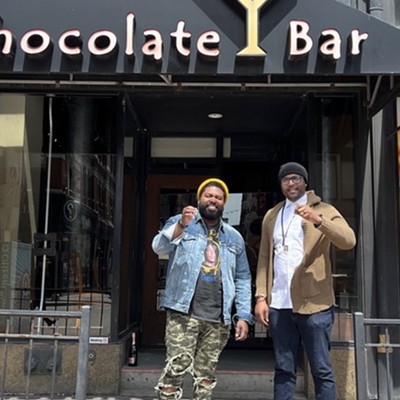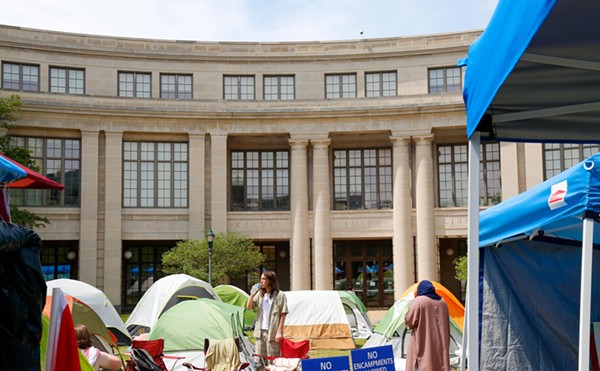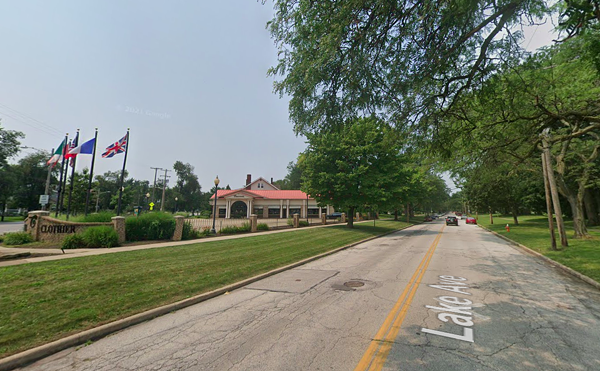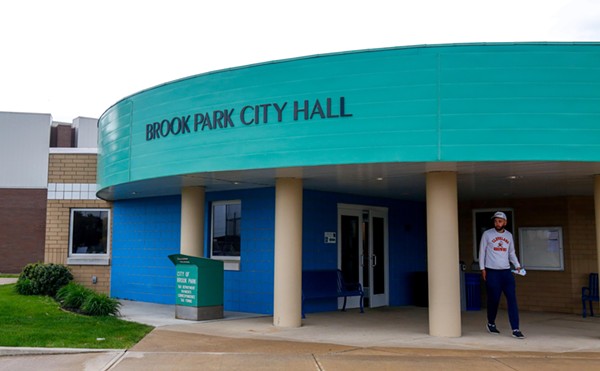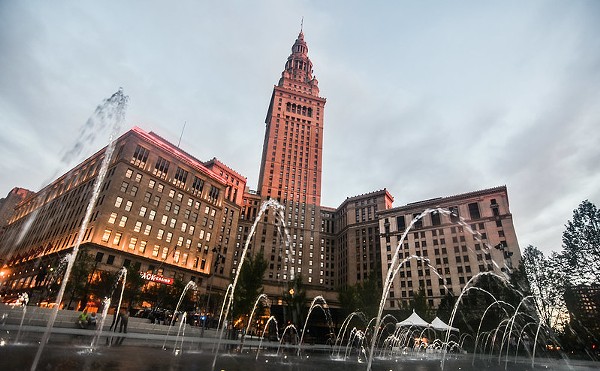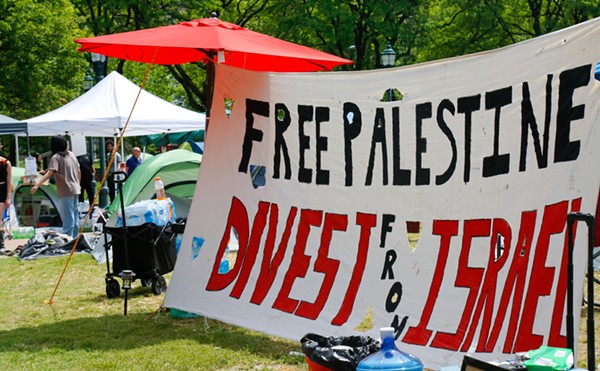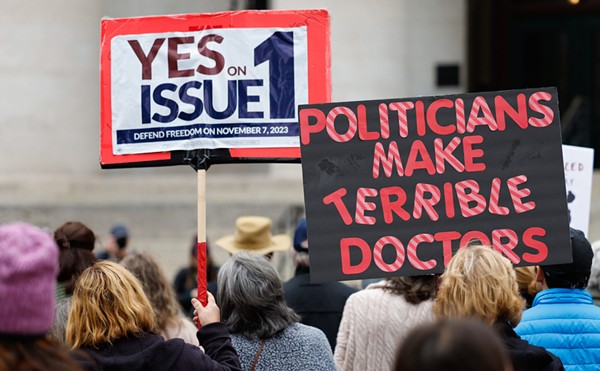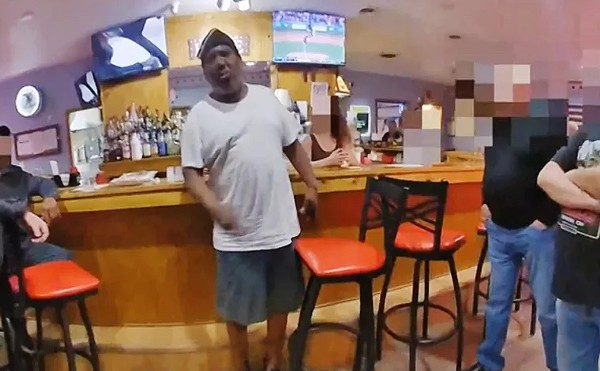The door opens onto a hall furnished with card tables, around which people middle-aged and older are playing poker. The hall leads to a cafeteria, and here the majority of card players have gathered.
It's blackjack or Texas hold 'em, and they aren't so much playing the game as numbed by it. Their eyes glaze as the cards fly by. Many smoke; the haze mutes the fluorescent light. Chips clink and cards shuffle, but there is no chatter on the floor of this makeshift casino.
Behold the gambling empire of Mike Moneypenny. Over the last several years, Moneypenny's operations have been the biggest draw for card players in Northeast Ohio. He offers free food and coffee, door prizes, and a cast of dealers fast enough to work Vegas.
In return, the players will follow Moneypenny to dismal locations like this one, dutifully emptying their wallets and maxing out their credit cards. The regulars consider Moneypenny a friend. So do the charities that are supposed to receive all the profits his casino weekends rake in.
The Cuyahoga County grand jury is less trusting, as evidenced by the indictment it handed down last week. Moneypenny and his associates are charged with corruption, theft, money laundering, and operation of a gambling house. Parma Police Detective Kevin Monnolly, who spearheaded the investigation, believes that Moneypenny's operation grossed around $6 million over two years.
Yet Moneypenny is just one of several in the region who operate traveling casinos under the pretense of aiding charitable causes. According to law-enforcement sources, these operators rule the gambling circuit as a cartel. Charities looking for a big casino fund-raiser must go through this cartel and pay a heavy fee -- as much as 90 percent of the earnings, skimmed off the top.
"It's organized crime," says Euclid Police Detective Kevin Blakely. "And it's huge."
I don't want to talk to you," says Mike Moneypenny, standing in the middle of the cafeteria-turned-casino, dressed in a faded T-shirt and jeans, arms folded, wispy moustache twitching nervously. With that, he turns toward the kitchen, where his family and close friends are exchanging chips for money. It's hard to imagine this man a kingpin.
But it doesn't take a criminal mastermind to exploit the gaping loopholes in Ohio's gambling laws.
A nonprofit can hire someone like Moneypenny, ostensibly to lend them equipment -- cards, chips, tables -- at a cost of roughly $2,000 for a four-day weekend. But if that charity wants high-rolling players and the big money that comes with them, they'd better offer the poker game Texas hold 'em, and they ought to accept Moneypenny's offer to bring his own dealers.
Texas hold 'em is the most lucrative game, and it's the most popular, because the stakes rise four times in the same hand, meaning that even at the table with the lowest stakes, each hand offers a pot of about $150. Players want a dealer fast enough turn out 30 hands in an hour.
The events are known as "Las Vegas Nights," and they typically stretch from Thursday to Sunday, 12 to 16 hours each day.
In Moneypenny's case, his people -- not the charity's -- keep the books. It's an honor system. And according to police, he compromises that honor with regularity. "Over 120 Vegas Nights [in] three years," says Detective Monnolly, "and not one was run legally."
Every crooked operator has his or her own style of skirting the law, but law-enforcement sources say the result is the same: The charity gets a fraction of the take, and the operator walks away with the rest.
Moneypenny had long dominated the Akron gambling circuit, but Cleveland's West Side is where he hit it big. Players called a hotline and listened for his advertisement: "Mike and Mindi [his wife] present Vegas Nights . . ." Players flocked to whatever location was listed next. No competing operator dared hold a game on the same weekend.
Except perhaps Clyde Dockery, who had his own loyal following on Cleveland's East Side. It earned him the same dubious regard from law enforcement.
"Am I saying Clyde's a criminal? No, not yet," says Blakely. But the detective has formed a theory based on the experiences of charities: "If Clyde knows a charity is losing its ass, he can call and say, 'You can do three events per year. I'll organize those. You'll get $3,500, and maybe that's more than you made last year on the bake sales.' But Clyde is generally making six or eight times that."
On December 4, the Wickliffe Police Department arrested Dockery on gambling charges. He has pleaded not guilty. Dockery, who has advertised in Scene and other newspapers, did not return calls seeking comment.
Mike Swaney sports the longest rap sheet in the business. A charity casino operator for 10 years, Swaney spent a year in prison for theft in the early 1990s. When cops try to shut him down, citing his felony record, Swaney points out that while felons can't organize bingo nights, they can run casino fund-raisers. Even so, when they demand proof that his event is for a charitable cause, Swaney often concedes the point and calls the game.
"He's a con man," says Sgt. Donald Cook, the Garfield Heights cop who busted Swaney last April, after learning that the charity for which Swaney was raising funds had no knowledge of the event. He pleaded guilty to gambling charges. The weekend after New Year's, another Swaney operation was shut down twice by Cleveland Police.
Judy Thomas and Sotorios "Sam" Georgakopoulos are cautionary tales of what happens when cartel solidarity breaks down. The two were rivals in 2000, which led Georgakopoulos to tip off Detective Monnolly on Thomas's misdeeds. But Monnolly also opened a file on Georgakopoulos, who was running casino nights to benefit charities that didn't even exist. He kept all the proceeds. In August 2002 Georgakopoulos pleaded guilty to racketeering, money laundering, and 21 counts of illegal gambling, for which he received a six-year prison sentence. Thomas, who has been cited for gambling offenses in Akron, Berea, and Parma, may have felt heat too. Her name hasn't been attached to a Vegas Night in roughly a year. She could not be reached for comment.
Still, Moneypenny was the biggest fish. Taking him down would send a strong message to the other operators in town. So that's where Monnolly and his partner, Detective Kevin Riley, concentrated their case.
Craftsmen Recreation Club, near Akron, is a camp for children with cancer as well as kids with troubled home lives. They go swimming, hiking, and canoeing on the camp's 65 picturesque acres around Rex Lake. They make friends and receive doting attention from counselors.
But it's not cheap, and though Craftsmen has room to house 200 kids per week, it can afford to bring in only 50. The club depends on the Masonic fraternity of Summit County for funds, and as that organization's membership has shrunk, so has the Craftsmen budget. Corporate donations have taken a hit since the recession as well.
"If we had more money, we'd spend every dime of it," says camp administrator Gregg Walton. "We overspend on these kids. I'm running negative $10-$20,000 budgets."
So Walton and the rest of camp management considered a Vegas Night fund-raiser. A mutual friend put them in touch with Moneypenny.
Detective Monnolly believes Moneypenny avoids charities like Craftsmen out of a sense of guilt -- better to skim off a youth football team or even a church than a camp for sick kids. Indeed, Walton says it was a year before Moneypenny would return his calls.
When finally the day came for Craftsmen's fund-raiser, Walton and others from the camp took a van ride to Cleveland. "We were going to supervise it," he says. But before Walton could arrive, Moneypenny phoned to report that the Vegas Night was canceled, supposedly because he couldn't get the proper permit for the building. "I wonder if it was canceled because we were coming up there," says Walton, who has since learned all about Moneypenny's fund-raisers through conversations with police. Monnolly says that Moneypenny operated under the Craftsmen name for two nights. If so, the nonprofit never received a payment.
Craftsmen was not the sort of fly-by-night charity Monnolly had been expecting. Upon arriving at the camp in July, he met Walton, who explained the camp's purpose and its desperate need for funds. On that day, teenage girls undergoing chemotherapy were anxiously preparing for the camp prom. Walton thinks he saw a tear in Monnolly's eye.
It might also have been rage. For a detective whose workload is largely drug trafficking, it had been hard to keep focused on illegal gambling, a crime of seemingly less social consequence. But after Craftsmen, the Moneypenny case acquired real moral weight. "This son of a bitch is ripping off these poor, dying kids," says Monnolly. "That's the moment I vowed to put him in prison."
But not all charities are such sympathetic victims. Police who have investigated Vegas Nights say the nonprofits who hire operators are often either woefully naive about the profit-skimming or so hard up for funds that they're willing to overlook it.
The Copley Community Fund of Akron had its first Vegas Night experience with Judy Thomas, the operator who has since dropped out of the gambling circuit. The charity's treasurer, Bob Grether, says she brought in a big crowd. Yet when the weekend was over, Grether says, she cut him a check that didn't even cover the hall's heat and electricity expenses.
So the group switched to Moneypenny. "We started getting $8,000 to $16,000," says Grether, "so we figured we were doing pretty good." But Monnolly's research suggests Moneypenny made an average of $50,000 to $60,000 per weekend.
Jack McManamon heads the West Boulevard Neighborhood Association, which prints a small newspaper for residents. Roughly 95 percent of the non-profit's revenues come from Vegas Nights. The group received checks of about $17,000 from Moneypenny. "According to the Parma Police, yes, he made more," says McManamon. "But it's not our place to go questioning him. He's giving us money to survive."
Nick Ardelian of the Ohio Veterans Coalition authorized a Vegas Night through Moneypenny. He says he is "absolutely" certain the coalition wasn't cheated out of funds. On the other hand, Ardelian can't explain why he's certain. "It's not our business to do audits," says Ardelian. "We're not counting heads. We're not counting money." He refused to say how much Moneypenny gave the coalition.
The Greater Akron Motorcycle Foundation received only $8,000 from its two events, which may have generated $100,000. A college-scholarship fund called AHEPA was allegedly skimmed on its Vegas Night. The founder of a religious group called F.A.M.E. told police he wasn't aware that his nonprofit was the beneficiary of a Moneypenny-run fundraiser.
Other nonprofit organizations knew that Moneypenny was lining his pockets. Our Lady of Mount Carmel's Reverend Richard Rasch told Monnolly that of the $48,000 raised by a Vegas-night weekend, half went to the church, the other half to Moneypenny.
Monnolly spoke to two men whom he identified as former dealers, one claiming to have received $20 an hour, the other $45, all in cash, from Moneypenny. Other dealers had their bank accounts subpoenaed, revealing large cash deposits, says Monnolly.
Joann Lambright, 57, of North Canton, says she treats Vegas Nights as a social outing. She motions to her friends at the tables. "These are all retired people. We like to play cards. That's all."
Lambright says that the players understand Moneypenny's reasons for staying out of Cleveland -- police harassment. But they still attend his events in Akron. "We follow him because it's an honest game," says Lambright. "He's not pocketing the money."
An elderly man remarks that his charity hired Moneypenny for an event and that he was highly pleased with the result. But the man refuses to give his name or that of his charity.
Lambright knows of Monnolly, whom she refers to as a "rogue cop" meddling in what is essentially a virtuous cause. "It's the charities who are really getting hurt," she says.
Lambright fails to mention that she is actually Moneypenny's mother-in-law -- and according to Monnolly, she's part of the scheme. The detective says that, besides Moneypenny's Vegas Nights, there were his storefronts, which offered instant-bingo tickets and slot machines. Monnolly claims that Lambright was the "bag lady," collecting the proceeds from storefronts and meticulously recording dollar figures in a notebook that will be a key exhibit at trial. Monnolly tracked roughly $80,000 worth of deposits to her bank account over a year, most of it in cash or checks bearing Moneypenny's name. Yet Monnolly says Lambright doesn't have a job. She was among the 30 people indicted.
Still, even those players who were no relation to Moneypenny liked the professionalism of his operation. "Most [Vegas Night] dealers are gambling-addict junkies or scumbags," says one player. "But his dealers seem like decent folks."
The players also know that skilled dealers wouldn't be spending 12 hours in a smoke-filled, windowless VFW hall for free -- even if the law says they must. "I say to the dealer, 'Hey, you must be involved in an awful lot of charities. I see you here every week,'" laughs one player. After winning a hand, "I tip and say, 'That better be going to the charity.' It's a big joke among the regulars."
Ultimately, though, the joke is on the players. For while dealers are said to make hundreds per night, the players occupy the same suffocating room and may lose thousands.
Often, the detectives assigned to narcotics also work gambling, and the similarities between the addictions are striking. Monnolly tells of a Vegas Night that operated below a banquet room. In the early morning hours, the building's plumbing gave out, and as toilets overran, human waste collected in puddles on the floor of the casino. Players gambled on, ignoring the stench.
For the addicted, Vegas Night gives way to Vegas Morning. Detective Blakely recalls arriving at a gambling hall just after dawn, when the previous night's event was winding down. Remaining players clung to the tables, begging the dealer for another hand.
"When the lights come on, it's revolting," says Blakely. "These folks have sat through six hours of losing, and to see them shrink away to the car, it's just so sad."
Yet the same people will ante up the very next week. "They don't want to see this stop, because they want the action," says one player. "People like Swaney and Moneypenny and Dockery, they all know the nature of gamblers."
And like the drug-addicted, chronic gamblers may resort to crime when all else fails. Last month, a player who had been losing for two consecutive nights at a Vegas Night in Akron game came back on the third night, wearing a ski mask and brandishing a gun. He's alleged to have taken $30,000. Fortunately for the Akron police, the man, Ernest Gaines, wore the same turquoise tennis shoes he'd worn the previous two nights, and he was easily identified.
Gamblers want to gamble, operators want to get rich, and charities want to survive. So all parties are committed to keeping the same secret. But even symbiotic relationships can hit the rocks.
Often, it happens when law enforcement breaks the cycle of self-interest, as with Mike Swaney, the longtime operator who has already been to prison for theft. Another felony conviction would mean a lengthy incarceration. Frank discussions with state investigators about his business tactics, however, can work to his advantage.
"When I've been down to the [state] Attorney General's office, I say, 'You have to know what we [operators] are doing wrong,'" says Swaney.
For instance, there's the matter of whether the dealers are really donating their weekends to charity, free of charge, as is legally required. Swaney, who earlier had stated that he didn't pay his dealers, turns sheepish. "You know I can't talk about that," he says. "I mean, let's be serious."
Police have had a difficult time proving another level of graft -- that between the casino operators and the halls they rent. By state law, the building must be owned by a charity or fraternal organization, which is why the events are usually held at VFW, American Legion, or Knights of Columbus halls. Often, the managers of those halls know that a Vegas Night brings in an avalanche of money.
"Hall managers have a tendency to have their hands out," says Swaney. "They have their hands in the operator's pocket. No doubt."
Of course, Swaney himself admits to sticky fingers. "Years ago, I had my hand further into the charity's pocket than I should have," he says. "But I changed." He tells of the warm feeling he derived from handing a $7,000 check over to a home for abused children.
In the next breath Swaney admits that he charges the charity far more for the equipment than he paid. This is illegal, but Swaney says it's necessary to recover his own time and expense. "I'm trying not to be unreasonable."
Swaney also reports that there is collusion among operators -- trading off weekends, so as not to compete for the same gamblers. "I have been invited to those meetings, but I don't go," says Swaney. Still, he admits to having schemed in the past. "The most I'd do is maybe I'd call Mike [Moneypenny] and say, 'When are you running?' Because I didn't want to run at the same time."
This could qualify as a pattern of corrupt activity, punishable under the racketeering statutes. The point is not lost on Swaney: "This sounds like RICO, doesn't it?" he says.
What's worse, while illegal operators may respect the turf of other illegal operators, they have no compunction about taking players away from legitimate operations. Told of a charity's efforts to hold a legal game, Swaney says, "If I had a hall next week, I'd run against them."
An illegal operator brings in dealers proficient in Texas hold 'em, who are much faster than volunteer dealers. "When the players go to a Vegas Night, they don't want some bumbling housewife dealing cards," says Lieutenant Gary Black of the Berea Police Department. So the high rollers bring their big money to the illegal games instead.
So for charities, the path of least resistance is to hire an operator and then just hope that, after the weekend, he's feeling generous enough to cut a fat check. It's better than nothing, and the operators know it.
"You can give a charity $1,000, and they're happier than hell," says Swaney. "That's $1,000 more than they had." Never mind that the operator may have turned a profit of $50,000.
The bank sign on Main Street in the town of Rittman says that it's minus 12 degrees on January 30, but it must feel even colder to John Riddle, who emerges from his apartment wearing handcuffs and an unzipped coat. The man in charge of events when Moneypenny isn't there, Riddle mumbles something about Parma police having a vendetta against Moneypenny, but makes no reply to questions about whether charities were bilked or dealers were paid.
Mike Moneypenny Jr., age 20, offers just two words upon his arrival at the Rittman police station: "Fuck off." He allegedly dealt cards at his dad's events, as did siblings and several other relatives.
There's no indication the former king of Northeast Ohio casinos had extravagant tastes. He lived just outside Rittman, in the bare, undulating country 15 minutes west of Akron, in a bungalow with cheap siding. He drove a silver Cadillac and a Ford Expedition. The latter was missing on the day police came to arrest him.
As of press time, Moneypenny still hadn't turned himself in, but the whereabouts of his fortune remains the real mystery. Monnolly tracked $3.3 million in bank deposits over two years, most of which he believes to have come from gamblers who could run their charge cards in exchange for chips. But Monnolly estimates that the majority of Moneypenny's alleged casino earnings was in cash, meaning there may be another $4-5 million unaccounted for.
In May, when police searched the Moneypenny residence in Rittman, they hoped to find a huge store of cash, bank statements in someone else's name, or keys to a safe-deposit box. They found none of these.
A portion of the money may have gone to Dominic Yannoni of Albuquerque, who was named in last week's indictment. Monnolly alleges that Yannoni sold Moneypenny video-gambling machines, some of which were installed at a storefront in the town of Orrville, near Rittman. Both Moneypenny and his son were convicted last fall on gambling charges connected with that storefront. But there may have been others -- the indictment mentions 15 illegal bingo operations. Monnolly says Moneypenny wrote several checks to Yannoni totalling roughly $500,000.
It's also possible that Moneypenny bungled away his wealth in the casino. Monnolly says Moneypenny made frequent trips to Detroit/Windsor and Las Vegas. Moneypenny was also an avid on-line gambler, says Monnolly. Still, one would think that of all people, Moneypenny would observe gambling's golden rule: The house never loses.
If the missing millions really are hidden, the key to locating them may be a conviction. Moneypenny might then be inclined to turn the cash over, in exchange for a reduced prison sentence. If that happens, Monnolly would like the biggest chunk to go to Craftsmen Recreation Club.
That's an exciting prospect for Gregg Walton, who will otherwise need to win state and federal grants if he's to keep the camp open. He admits that he'd still consider a Vegas Nights fund-raiser -- especially if Craftsmen's survival depended on it.
"I would love to find a legitimate operator and do it right, because we need it," he says. "Property tax is coming due next month, and I have to pray, because I don't know where the money is coming from."

